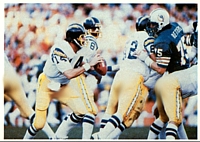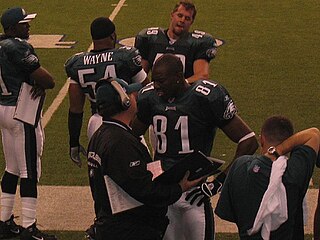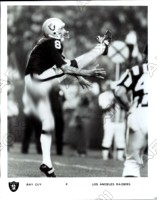
Canadian football, or simply football, is a sport in Canada in which two teams of 12 players each compete on a field 110 yards (101 m) long and 65 yards (59 m) wide, attempting to advance a pointed oval-shaped ball into the opposing team's end zone.

In several forms of football, a forward pass is the throwing of the ball in the direction in which the offensive team is trying to move, towards the defensive team's goal line. The legal and widespread use of the forward pass distinguishes gridiron football from rugby football from which the gridiron code evolved, in which the play is illegal.

In gridiron football, a lateral pass or lateral occurs when the ball carrier throws or hands the football to a teammate in a direction parallel to or away from the opponents' goal line. A lateral pass is distinguished from a forward pass, in which the ball is thrown forward, towards the opposition's end zone. In a lateral pass the ball is not advanced, but unlike a forward pass a lateral may be attempted from anywhere on the field by any player to any player at any time.

A touchdown is a scoring play in gridiron football. Scoring a touchdown grants the team that scored it 6 points. Whether running, passing, returning a kickoff or punt, or recovering a turnover, a team scores a touchdown by advancing the football into the opponent's end zone. More specifically, a touchdown is when a player is in possession of the ball, any part of the ball is in the end zone they are attacking, and the player is not down.

A wide receiver (WR), also referred to as a wideout, and historically known as a split end (SE) or flanker (FL), is an eligible receiver in gridiron football. A key skill position of the offense, WR gets its name from the player being split out "wide", farthest away from the rest of the offensive formation.

In ball-playing competitive team sports, an interception or pick is a move by a player involving a pass of the ball—whether by foot or hand, depending on the rules of the sport—in which the ball is intended for a player of the same team but caught or otherwise brought under control by a player of the opposing team, who thereby usually gains possession of the ball for their team. It is commonly seen in football, including American and Canadian football, as well as association football, rugby league, rugby union, Australian rules football and Gaelic football, as well as any sport by which a loose object is passed between players toward a goal. In basketball, this is called a steal.
Strategy plays a crucial role in American football. Both teams carefully plan various aspects of their gameplay in an effort to win. This includes deciding on formations, selecting players for specific positions, and assigning roles and instructions to each player on offense and defense.
In gridiron football, clock management is an aspect of game strategy that focuses on the game clock and/or play clock to achieve a desired result, typically near the end of a match. Depending on the game situation, clock management may entail playing in a manner that either slows or quickens the time elapsed from the game clock, to either extend the match or hasten its end. When the desired outcome is to end the match quicker, it is analogous to "running out the clock" seen in many sports. Clock management strategies are a significant part of American football, where an elaborate set of rules dictates when the game clock stops between downs, and when it continues to run.
An incomplete pass is a term in gridiron football which means that a legal forward pass is not successfully caught by an eligible offensive player within the field of play. An incomplete pass can occur if (1) the ball hits the ground in the field of play before a player on either team gains possession; (2) the ball is caught by a player on either team who, at the moment of possession is out of bounds; or (3) the ball is thrown outside the field of play. An incomplete pass causes the down to advance by one and the offensive team gains no yards. The game clock is stopped.
A trick play, also known as a gadget play, gimmick play or trickeration, is a play in gridiron football that uses deception and unorthodox tactics to fool the opposing team. A trick play is often risky, offering the potential for a large gain or a touchdown if it is successful, but with the chance of a significant loss of yards or a turnover if not. Trick plays are rarely used not only because of the riskiness, but also to maintain the element of surprise for when they are used.

The Epic in Miami was the National Football League AFC divisional playoff game between the San Diego Chargers and Miami Dolphins that took place on January 2, 1982 in the Miami Orange Bowl. The game, won by the Chargers in overtime, 41–38, is one of the most famous in National Football League lore because of the enormity of scoring, the conditions on the field, the performances of players on both teams, and the numerous records that were set.

A comparison of American football and rugby union is possible because of the games' shared origins, despite their dissimilarities.
A comparison between American football and rugby league is possible because of their shared origins and similar game concepts. Rugby league is arguably the most similar sport to American football after Canadian football: both sports involve the concept of a limited number of downs/tackles and scoring touchdowns/tries takes clear precedence over goal-kicking.
In American football, a play is a close-to-the-ground plan of action or strategy used to move the ball down the field. A play begins at either the snap from the center or at kickoff. Most commonly, plays occur at the snap during a down. These plays range from basic to very intricate. Football players keep a record of these plays in a playbook.
In Gridiron football, a completion or completed pass occurs when an eligible receiver successfully catches a forward pass thrown by the quarterback without the ball touching the ground. It is one of the three possible outcomes of any pass thrown during a passing play, with the other two being incompletion and interception.
The following terms are used in American football, both conventional and indoor. Some of these terms are also in use in Canadian football; for a list of terms unique to that code, see Glossary of Canadian football.

In sports, out of bounds refers to being outside the playing boundaries of the field. The legality of going out of bounds, and the ease of prevention, vary by sport. Sports that use this term include American football, Canadian football, field lacrosse, basketball, rugby union, rugby league, and association football.

In gridiron football, a punt is a kick performed by dropping the ball from the hands and then kicking the ball before it hits the ground. The most common use of this tactic is to punt the ball downfield to the opposing team, usually on the final down, with the hope of giving the receiving team a field position that is more advantageous to the kicking team when possession changes. The result of a typical punt, barring any penalties or extraordinary circumstances, is a first down for the receiving team. A punt is not to be confused with a drop kick, a kick after the ball hits the ground, now rare in both American and Canadian football.

A route is a pattern or path that a receiver in gridiron football runs to get open for a forward pass. Routes are usually run by wide receivers, running backs and tight ends, but other positions can act as a receiver given the play.











